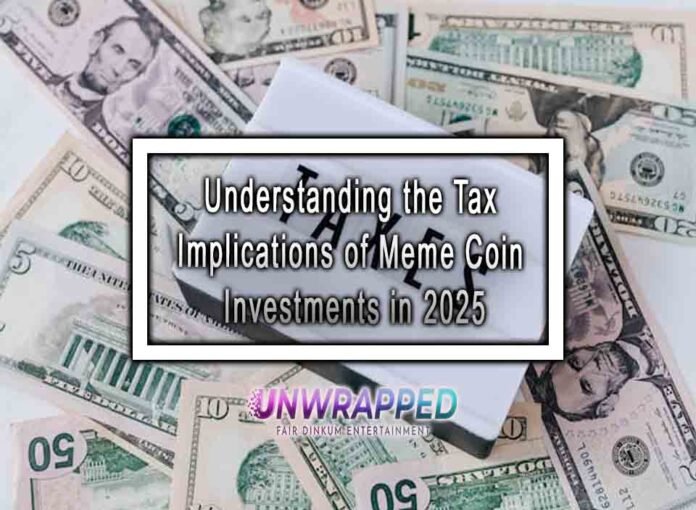Cryptocurrencies, including meme coins, have become increasingly popular among investors for their potential to deliver substantial returns. However, meme coin investments come with tax obligations that every investor must understand. In 2025, as global regulatory frameworks around cryptocurrencies evolve, the tax treatment of meme coins remains a critical aspect of financial planning.
This article explores how meme coin profits are taxed, the importance of record-keeping, and guidelines for reporting transactions, ensuring investors stay compliant with tax laws.
Introduction: Tax Obligations Related to Cryptocurrency Investments
Meme coins, despite their playful origins, are treated as taxable assets in most jurisdictions, including Australia. Tax authorities view cryptocurrency as property or assets, not as currency, which means transactions involving meme coins may trigger tax events.
Common Taxable Events:
- Selling Meme Coins: Converting meme coins to fiat currency (e.g., AUD).
- Trading Meme Coins: Swapping one cryptocurrency for another.
- Using Meme Coins for Purchases: Spending meme coins on goods or services.
- Receiving Meme Coins: As payment, staking rewards, or airdrops.
Failing to report these events accurately can lead to penalties, making it essential for investors to understand their tax obligations.
Capital Gains Tax (CGT): How It Applies to Meme Coin Profits
In most countries, including Australia, meme coins are subject to Capital Gains Tax (CGT). This applies whenever you dispose of your cryptocurrency, whether through a sale, trade, or use.
Calculating Capital Gains:
- Determine the Cost Base: Includes the purchase price of the meme coins plus any associated costs (e.g., transaction fees).
- Calculate the Disposal Proceeds: The amount you received when you sold, traded, or spent the meme coins.
- Capital Gain or Loss:
- Capital Gain: If the disposal proceeds exceed the cost base.
- Capital Loss: If the disposal proceeds are less than the cost base.
Example:
- Bought 10,000 SHIB for $100.
- Sold for $200.
- Capital Gain = $200 – $100 = $100 (subject to tax).
CGT Discounts:
- Individuals holding meme coins for more than 12 months may qualify for a 50% CGT discount, reducing their taxable gain.
Record-Keeping: Why It’s Crucial
Maintaining accurate records of all meme coin transactions is critical for calculating tax obligations and demonstrating compliance during audits.
What to Record:
- Transaction Details:
- Date and time of transactions.
- Type of transaction (buy, sell, trade, etc.).
- Value in AUD:
- The market value of the meme coins at the time of the transaction.
- Fees:
- Transaction and brokerage fees.
- Purpose:
- Reason for the transaction (e.g., investment, payment, etc.).
Best Practices for Record-Keeping:
- Use cryptocurrency portfolio tracking tools (e.g., CoinTracking, Koinly).
- Regularly export transaction history from exchanges.
- Back up records to ensure they’re not lost.
Tax Reporting: Guidelines for Meme Coin Transactions
1. Identify All Taxable Events
Review your transaction history to identify any disposals of meme coins that may have triggered a taxable event.
2. Calculate Net Capital Gains
Subtract any capital losses from your total capital gains. Losses can offset gains within the same financial year, and unused losses can be carried forward.
3. Report Gains and Losses
Include your net capital gains or losses in your annual tax return under the relevant section for investment income.
4. Include Other Crypto-Related Income
- Staking Rewards: Considered ordinary income, taxed at your marginal rate.
- Airdrops: Taxed as income based on their market value at the time of receipt.
5. Seek Professional Advice
Consult a tax professional with expertise in cryptocurrency to ensure compliance and optimize your tax position.
Conclusion: Ensuring Compliance with Tax Laws in Meme Coin Investments
As meme coins continue to grow in popularity, their tax implications remain a critical consideration for investors. By understanding how taxes apply to meme coins, maintaining detailed records, and following reporting guidelines, you can minimize risk and ensure compliance with evolving regulations.
Key Takeaways:
- Meme coins are subject to CGT, requiring careful tracking of profits and losses.
- Accurate record-keeping is essential for compliance and audit protection.
- Seek professional advice to navigate complex tax scenarios.
Staying informed and organized will not only help you meet your tax obligations but also position you for long-term success in the meme coin market.
Disclaimer: This article is for informational purposes only and does not constitute financial or tax advice. Consult a tax professional for advice tailored to your specific circumstances.
See Also: The Future of Meme Coins: What to Expect in 2025 and Beyond











